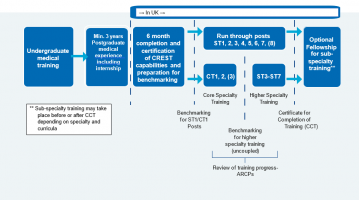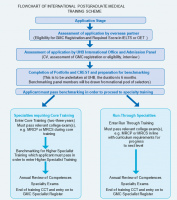International Post Graduate Medical Training Scheme
Matching the healthcare needs of growing, ageing populations with the right supply of trained health professionals is a global challenge.
The International Postgraduate Medical Training Scheme (IPGMTS) enables overseas doctors, by arrangement with international governments, to undertake full speciality training to UK standards. This takes doctors from entry to the Certificate of Completion of Training (CCT) and recognition in the GMC specialty register, in England, before returning home to practice as consultants in their chosen field.
Please click on the links below for further information about the IPGMTS programme or see the links to the right.
The International Postgraduate Medical Training Scheme: summary
- The NHS in England is one of the first and highest quality health systems providing Universal Health Coverage in the world. The NHS’s clinical workforce is educated and trained in some of the finest clinical learning environments. Well established close collaboration between a wide range of organisations including Health Education England, NHS Trusts, universities and the Royal Colleges mean the UK’s medical specialty training is truly world class.
- The UK’s system of healthcare education and training ensures that every generation of healthcare professional continually learn and develop their skills to the highest standard. As clinical practice is constantly changing, training is updated to reflect the latest research. UK postgraduate medical training institutes are particularly strong at embedding research into the culture of education and training. Doctors in training are therefore fully equipped to deal with new and emerging health issues.
- The International Postgraduate Medical Training Scheme (IPGMTS) aims to provide medical specialty training in England, giving doctors a full replication of NHS competence-based training.
- The IPGMTS enables overseas doctors, by arrangement with international governments, to undertake full specialty training to UK standards. This takes doctors from entry to the Certificate of Completion of Training (CCT) and recognition in the General Medical Council (GMC) specialist register, in England, before returning home to practice as consultants in their chosen field.
- IPGMTS programmes can be in any of the 65 specialties or 31 sub-specialties accredited by the GMC. This includes: Emergency Medicine, Psychiatry specialties, Histopathology, surgical specialties, Anaesthesia, Paediatrics, Obstetrics and Gynaecology and medical specialties including Geriatric Medicine, Acute Internal Medicine and Rehabilitation Medicine.
- IPGMTS trainees are sponsored by overseas governments or institutions and are in addition to the UK’s future medical workforce needs. Places are limited and only open via government to government agreements.
- The scheme is sponsored by NHS HEE, the UK Government strategic workforce body of the NHS. The programme is delivered in partnership with University Hospitals Birmingham NHS Foundation Trust, one the England’s most prestigious university hospitals.
- The first cohort of doctors arrived in 2020. Case studies are available via https://global.hee.nhs.uk/ipgmts/case-studies-ipgmts/.
The NHS: the premier destination for healthcare education and training
- Matching the healthcare needs of growing, ageing populations alongside managing new and emerging health issues with the right supply of trained health professionals is a global challenge. Governments and healthcare organisations need better ways to deliver high-quality, accredited education and training, and many are turning to the UK for support.
- The NHS is internationally renowned for the quality of its medical education and training. If you need to develop your skills as a medical expert, we have the institutions to make this happen. The IPGMTS provides applicants with a world class medical education and training programme:
- tailored to individual needs
- founded on proven systems for driving high quality and standards in the long term
- delivered in cutting-edge training facilities of the University Hospitals Birmingham NHS Foundation Trust and the wider West Midlands.
- focused on building the future medical leaders and educators of tomorrow
Programme entry requirements
- All doctors on IPGMTS programmes work with UK patients and are therefore required to be fully registered with the GMC. In addition to a medical degree all applicants must meet all relevant GMC requirements. This includes demonstrating English language and clinical competence, and good standing in their country of origin.
- English Language. Applicants must demonstrate their knowledge of English using either an acceptable International English Language Testing System (IELTS) or Occupational English Test (OET) certificate from the last two years.
- Clinical competence. Applicants must demonstrate their clinical competence by showing three full years post-graduate experience on the CV, passing an interview panel, and meeting the benchmarking standard for the relevant UK post-graduate training programme.
- Good standing. A certificate of good standing from each medical regulatory authority they have been registered or licensed with in the last five years.
- Please see here for further information on eligibility requirements including useful links – https://global.hee.nhs.uk/ipgmts/eligibility-key-dates/.
Programme overview
- The IPGMTS enables overseas doctors, by arrangement with international governments, to undertake full specialty training, from ST1/CT1 through to the Certificate of Completion of Training (CCT) and recognition in the GMC specialist register in England before returning home to put their new skills into practice.
- For the first six months in the UK, doctors will complete University Hospitals Birmingham’s bespoke induction programme, which will introduce applicants to living in the UK and working in the NHS; help applicants put together a portfolio; demonstrate the competences required for to fully sign off a Certificate of Readiness to Enter Specialty Training (CREST) and prepare for benchmarking.
- Following the induction programme, IPGMTS is a full replication of the NHS competence-based specialty training scheme and is delivered to the same high quality and standards as training for our own doctors.
- While all doctors training as part of the IPGMTS are performing “hands-on” care equivalent to UK trainees, all IPGMTS posts are in addition to those needed for the UK’s future consultant requirements and fully funded by the partner Government.
- IPGMTS programmes can be in any of the 65 specialties or 31 sub-specialties accredited by the GMC.
- The UK’s medical royal colleges and faculties set the curricula for UK training programmes.
- The GMC approve curricula and assessment systems for each training programme. with the GMC standards.
- Depending on the curricula agreed with the GMC, each specialty or sub-specialty training programme can range from 3 to 8 years.
Training Programmes
- Progression through all training programmes is subject to successful achievement of the outcomes for each year. Doctors are assessed by means of the annual review of competences, the ARCP (Annual Review of Competency Progression) by the relevant Postgraduate School. The trainee has to provide a portfolio of evidence for the ARCP. Reports from their Educational and Clinical supervisors are taken into account.
- Specialties offer one of two types of training programme (see Figure 1 below); either uncoupled or run through.
- In uncoupled training programmes, the specialty programme is split into two stages: core training and higher specialty training. To progress to the next stage, applicants must be benchmarked as well as demonstrating satisfactory training outcomes. Core training is broad based and thus allows the applicants flexibility to apply for higher specialty training in more than one specialty. For example, a core surgical trainee may elect to apply for higher specialty training in general surgery or vascular surgery.
- Core training can be 2 or 3 years in length depending on the specialty. The first year of core training is termed CT1, the second year CT2, and then CT3. When a doctor moves into higher specialty training, the designation changes from CT to ST (Specialty Training). This means a doctor who has completed two years of core training in surgery will be designated ST3 when they move into general surgery.
- Uncoupled specialties include: All branches of Internal Medicine, most surgical specialties, Anaesthetics, Emergency Medicine & Psychiatry.
- In run-through training, doctors apply for the first year of the programme which is called ST1 (Specialty Training Year 1). There is no further application, benchmarking or selection process after this. Run-through training programmes last between 5 to 8 years.
- Run through specialties include: Paediatrics, Obstetrics & Gynaecology, Ophthalmology, Radiology, Cardiothoracic Surgery & Neurosurgery.
Overview of IPGMTS in the UK

Flowchart of IPGMTS

University Hospitals Birmingham NHS Foundation Trust
- University Hospitals Birmingham, which is by most measures one of the largest teaching and educational institutions in England, is the delivery partner of Health Education England for the International Postgraduate Medical Training Scheme. It is one of the highest performing healthcare organisations in Europe with a proven international reputation for its quality of care, information technology, clinical education and training and research.
- University Hospitals Birmingham has been the principal teaching hospital for the University of Birmingham Medical School providing clinical education and training to undergraduate medical students, dental students, postgraduate doctors and dentists and nurses for the last 200 years. There is a long tradition of training doctors, dentists and nurses from around the world. At the core of this tradition is University Hospitals Birmingham’s philosophy that excellence of clinical care can only be delivered on the bedrock of education and clinical research.
- University Hospitals Birmingham has several overseas organisations with which it has formal agreements for the provision of postgraduate medical education and training. The training is provided at a junior and senior level and is overseen by its International Institute.
- It is because of this philosophy and its experience in providing education and training to overseas doctors, dentists and nurses that Health Education England has partnered with University Hospitals Birmingham to deliver the International Postgraduate Training Programme.
The International Office at UHB
- The administrative arm of the International Institute at UHB is the International Office. All the administrative aspects of the International Medical Postgraduate Training Programme are managed by the International Office. Its specialist team guides applicants through the entire application process from first contact to arrival in Birmingham. Applicants receive advice and assistance with GMC registration, visa sponsorship and application, induction, benchmarking, and CREST completion. The focus of the International Office is to provide applicant support to enable an overseas doctor to settle in the UK so that they can focus on their training.
NHS Health Education England: the NHS strategic workforce body
- NHS Health Education England (HEE) has the statutory responsibility to ensure that the NHS workforce is available in the right numbers and has the necessary skills, values and behaviours to meet patients’ needs and deliver high quality care.
- As the NHS workforce organisation for England, HEE is uniquely placed to support the overseas governments’ ambitions to become a global centre of excellence for healthcare. HEE does this by embedding global skills, learning and innovation, supporting local NHS organisations to engage in global activity as a way to attract and retain staff, bringing experienced overseas staff to work in the NHS on placements.
- As well as playing a facilitative role to ensure the collective efforts and expertise of the NHS, Health Education England is coordinated and aligned to the overseas objectives of Government departments including the Department of Health and Social Care (DHSC), the Foreign Commonwealth and Development Office (FCDO), and the Department of International Trade (DIT).